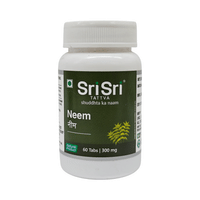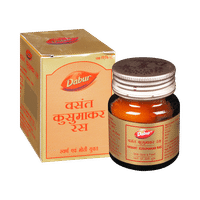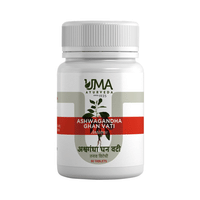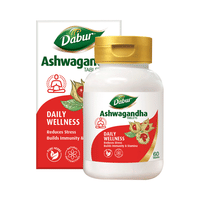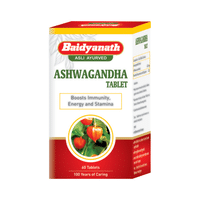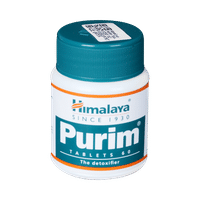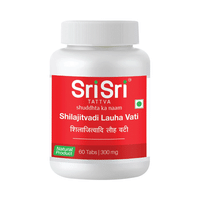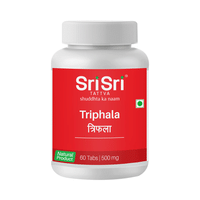Patanjali Ayurveda Giloy Ghanvati | For Debility, Fever, Skin & Urinary Disorders
Patanjali Ayurveda Giloy Ghanvati | For Debility, Fever, Skin & Urinary Disorders
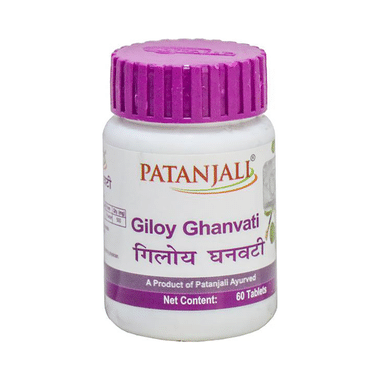
Patanjali Ayurveda Giloy Ghanvati
- For Debility, Fever, Skin & Urinary Disorders
Patanjali Ayurveda Giloy Ghanvati is an ayurvedic supplement that helps support immune health and promote general wellness. It helps build strength and stamina to improve energy levels. The tablets aid in post-illness recovery and help maintain overall health. Giloy, an active ingredient in the tablet, has an antipyretic activity that may support reduction of fever symptoms. It is known to support the bodys natural response to common cold, fatigue, and general weakness. This ayurvedic tablet is also traditionally used to support platelet levels. It also aids in toxin removal, promoting better skin and skin regeneration by increasing collagen production.
Key Ingredients:
Giloy
Key Benefits:
It can be used for general weakness and the common cold
Aids in relieving constipation with mucus in the stool
Supports healthy cholesterol levels
Helps support the immune system
Acts as supportive therapy for individuals with autoimmune disorders
It improves your appetite and aids in overall growth
Plays a key role in traditional support for skin conditions
Helps deal with urinary problems, including urinary tract infections
Indications:
This is indicated in cases of general debility, fever, and skin and urinary conditions.
Concerns It Can Help With:
["general weakness", "common cold", "constipation with mucus in stool", "cholesterol management", "immune-deficiency disorders", "autoimmune disorders", "appetite improvement", "skin conditions", "urinary problems including urinary tract infections", "fever", "dengue fever", "low immunity", "general debility", "skin and urinary conditions"]
Dosage:
["Above 12 years: 1 tablet twice daily", "Below 12 years: ½ tablet twice daily"]
Directions For Use:
Above 12 years: 1 tablet twice daily
Below 12 years: ½ tablet twice daily
Safety Information:
Read the label carefully before use
Store in a cool and dry place
Do not exceed the recommended dosage
Keep out of reach of children
Quick Tips:
["Along with the tablet, it is advised to have a healthy diet loaded with essential nutrients."]
Faqs:
Q. Can giloy be used to reduce a fever? Giloy may help in reducing fever symptoms due to its javarghana (antipyretic) property. As per ayurveda, two factors lead to high fever, the first is ama and the second is any foreign particle or organism. Giloy supports digestion and absorption due to its deepan (appetizer) and pachan (digestive) properties, which helps prevent the formation of ama. It also supports immunity to help the body respond to foreign particles or organisms due to its Rasayana property.
Q. How does Giloy support during dengue? Giloy is traditionally used to support immune health during dengue fever and has anti-inflammatory and antipyretic properties. Regular intake of giloy may help support immune function and platelet levels.
Q. Can I take giloy on an empty stomach? Yes. This ayurvedic supplement can be taken on an empty stomach in the morning to support liver health and assist with overall wellness. However, talk to the doctor to know the right time and dose of this supplement, as it might vary among individuals with different concerns.
Q. Does giloy help boost immunity? Yes, giloy being an immunomodulator, helps to regulate and support immunity. It is due to the presence of certain chemical constituents like magnoflorine that activate the lymphocytes or immunity-supporting cells. These cells further help the body to maintain immunity by responding to disease-causing pathogens. It also has rasayana (rejuvenation) property which supports the bodys tendency to maintain good internal health.













